Term 1 Chapter 1 | 3rd Science - My Body | 3rd Science : Term 1 Unit 1 : My Body
Chapter: 3rd Science : Term 1 Unit 1 : My Body
My Body
Unit 1
My Body

Learning Objectives
After learning this
lesson, students will be able to
* know the benefits of
hand washing
* understand
self-hygiene
* acquire the habit of
using toilets and avoiding open defecation
* know the precautions to
protect the sense organs
* recognize the
differences and similarities in people‛s appearance and abilities
* understand good touch
and bad touch
* grasp the importance of
physical exercises
Tick (✓) the items used for personal hygiene
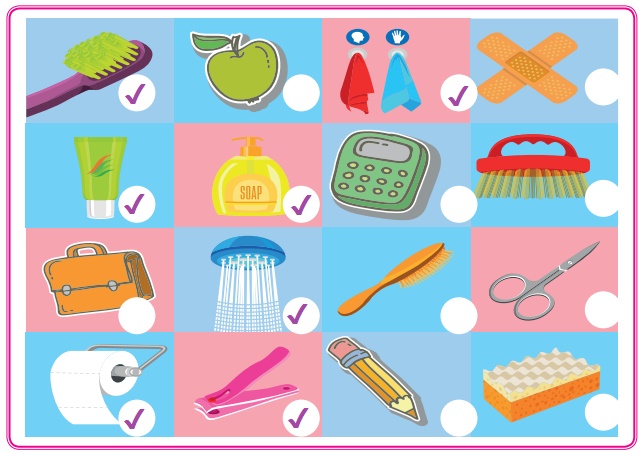
I. Cleanliness
Mithra is watching TV with her
parents. An advertisement in the TV shows a toilet with germs. Mithra asks her
dad what they are. He explains to her about germs.
Do you know about germs?
Germs are microorganisms that affects
our body. They are found in all the places. If we do not maintain cleanliness,
the germs will infect us and cause many diseases to us.
1. Hand Washing
Dialogue between Shruthi and her
mother. (After playing outside, Shruthi returns home)
Shruthi: Mom, I am so hungry. Give
me
something to eat.
Mother: Shruthi, go and wash your
hands.
Shruthi: No Mom, I want to eat
first.
Then I wash my hands.
Mother: No, you must wash your
hands.
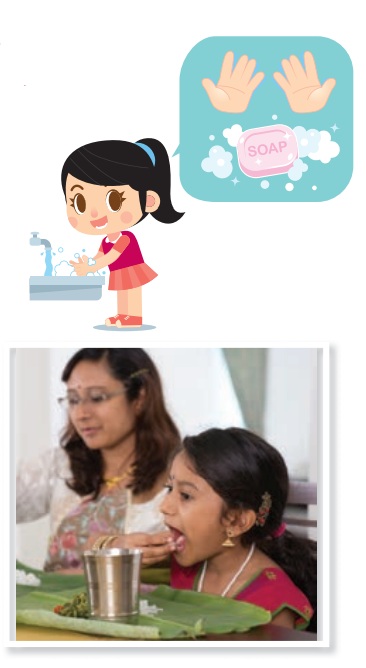
Shruthi: Mom, is it necessary to
wash hands before eating?
Mother: Yes, look at your hands.
Is it clean or dirty?
Shruthi: My hands are too dirty,
Mom.
Mother: Where does the dirt stick
in your hands?
Shruthi: Under the nails, in the
ridges…
Mother: Yes, these are the places
where the germs are hiding.
Shruthi: Is it so?
Mother: Yes, it is important to
wash your hands. It is a simple habit that keeps you healthy.
(Mom starts explaining the importance of simple hand washing technique)
Let us Do
Steps of Hand Washing
* Wet your hands
* Apply enough soap (coin size)
* Rub the palms
* Rub the back of each hand together
* Rub both hands holding all fingers (interlocked)
* Rub the back of the fingers
* Rub the tip of the fingers
* Rub the thumbs and the ends of the wrists
* Rinse both hands properly with enough water
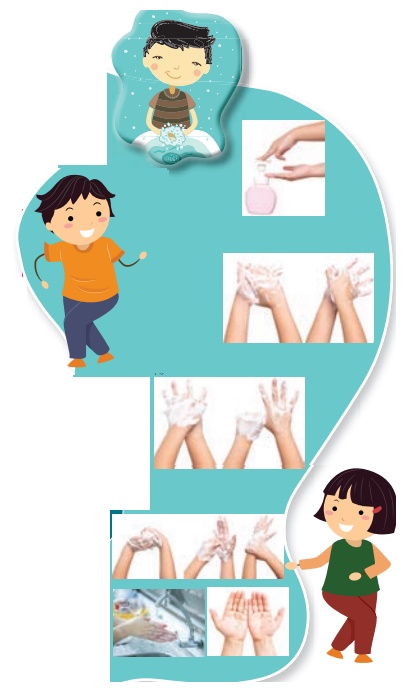
Benefits of Hand Washing
* Kills or removes germs
* Lowers the risk of
diseases like Diarrhoea
* Prevents eye infections
* Reduces the risk of respiratory infections
Let us draw – Germy Hand
1. Trace your hand in a white
sheet using pencil.
2. Draw the pictures of small
germs in the hand.
3. Colour the germs.
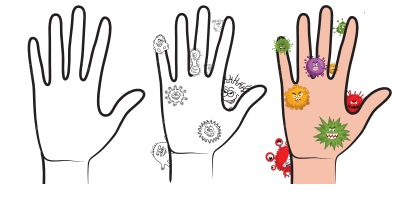
Let us Write
Complete the Worksheet
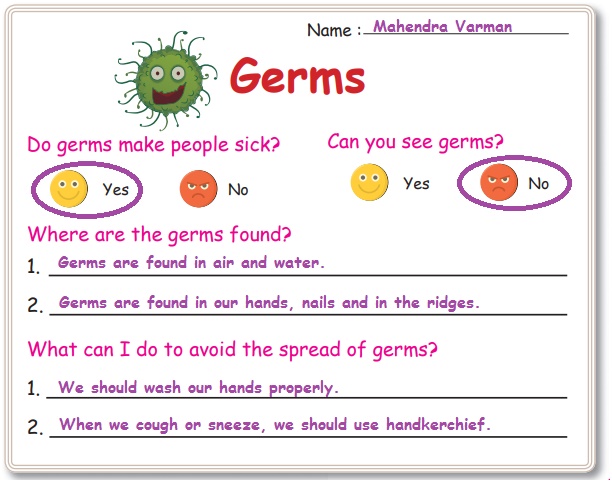
Name : Mahendran
Do germs make people sick? Yes No
Can you see germs? Yes No
Where are the germs found?
1. Germs are found in air and water.
2. Germs are found in our hands, nails and in the ridges.
What can I do to avoid the spread of germs?
1. We should wash our hands properly.
2. When we cough or sneeze, we should use handkerchief.
Think Zone
Preethi often bites her nails. Is it a good habit? Give reason.
Biting nails is not a good habit.
Because germs are found under the nails, in the ridges.
Do you know
Global Hand Washing Day is
observed on October 15.
Think and Discuss
Arun usually eats food
or snacks without washing hands properly. Is it correct? Give
reason.
It is not correct. Because germs are found in dirty hands.
2. Using Toilets
In the world, nearly one billion
people have no access to toilet at all and they are forced to do open
defecation. Open defecation spreads diseases such as cholera and diarrhoea.
Groundwater is polluted by toilets and it also causes diseases. Children also
get affected by intestinal worms which causes anaemia. So, it is necessary to use toilets.
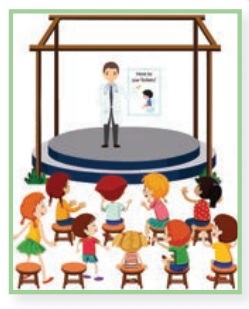
Do you Know
World Toilet Day is
observed on November 19.
Why is it important to
have a toilet?
Having a toilet
*
Prevents diseases like cholera.
* offers privacy.
* is convenient.
* is safe.
Effects of open
defecation
* Water borne diseases
* Diseases caused by insect carrier
* Pollution
What should we do to
wash out the intestinal worms?
We should use toilet and
avoid open defecation. We should wash our hands after using the toilet. These
will help us to have a healthy life.

Do you know
National De-worming Day
is observed on February 10.
More to know
Sulabh international
Museum of Toilets is in Delhi, India. It exhibits different toilet models from
50 countries across the world – spanning from 3000 BC till the 20th century.
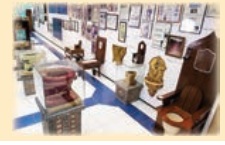
3. Bathing
Discuss with group
*
Why do we take bath?
* Why is it important to take bath daily?
* Why do we use soap to clean our body?
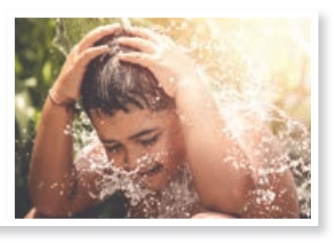
Importance of bathing
*
Cleanses the body
* Removes dirt and odour
* Protects oneself from infection
* Improves blood circulation
Do you know
World Health Day is observed
on April 7.

Safety measures in
Bathroom
*
Do not play with water or run around
in the bathroom. You may get hurt.
* Do not touch the sharp objects such as blades, razors and scissors
kept in the bathroom.
* Use hot water under the supervision of an adult only.
* Do not leave soap bar on the floor. Someone may slip due to
it.
* Do not leave the bathroom floor wet. Dry the floor using a
wiper before you leave.
* Do not touch electric switches with wet hands. You may get
hurt with an electric shock.
Do you know
The fruits of Soapberry tree are Saponin-rich and used as a soap substitute.
Put a tick (✓) for correct action and cross (×) for wrong
action.

Let us Answer
Read the statements
given below. Identify whether it is Right (✓) or Wrong (×) and put the suitable symbol.
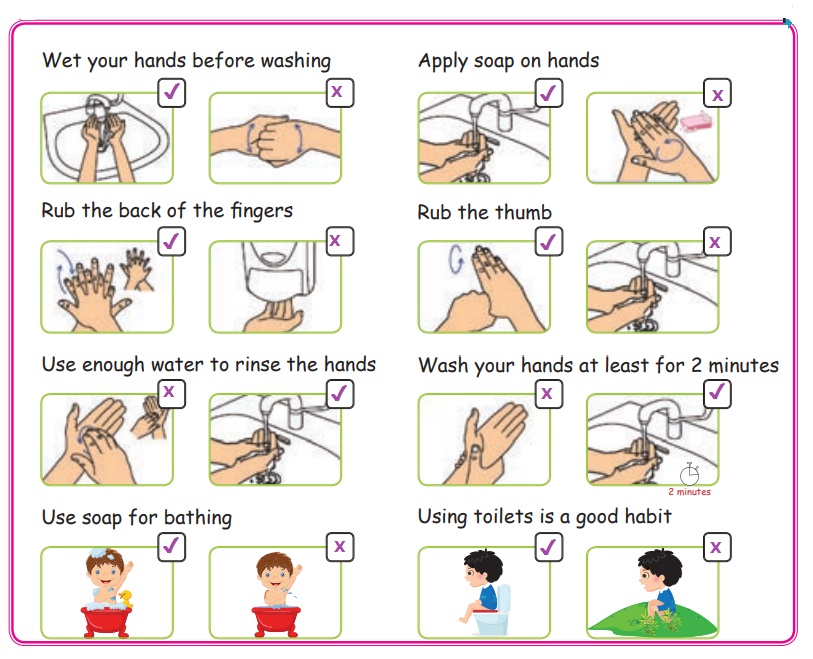
Let us
Find
Varun is in the bathroom. He is searching the things to take
bath. Help him to find the things by colouring them.
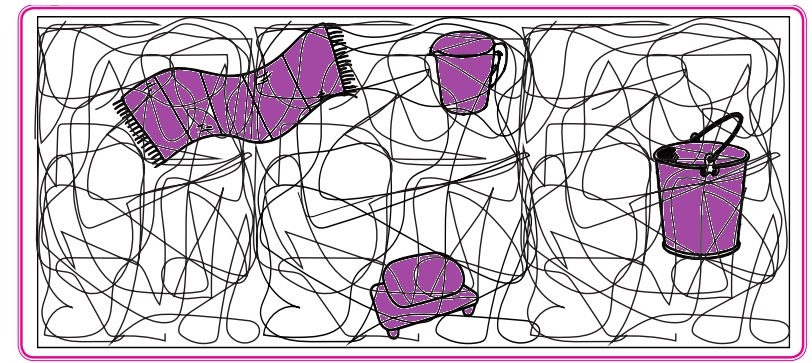
II. Protecting Sense organs
Sense organs helps us to observe and understand the world around
us. There are five main ways we can do this: through sight (with our eyes),
touch (with our skin), smell (with our nose), taste (with our tongue) and
hearing (with our ears).
In this section we will discuss the ways by which we can take care
of our sense organs.
By nature, all the sense organs have some ways to protect
themselves. For example, the eyelids and lashes protect the eyes from dust and
other foreign particles.
How should we take care of our sense organs ?
Think Zone
Anu plays with her baby brother. As he cries, she gives him a pencil. On
seeing this, Anu‛s mom was shocked. She quickly takes the pencil back. Do you
know why?
Answer: Pencil has a sharp end. It may hurt the baby's eye or ear.
a. EYES

Do‛s
* Read with proper light.
* Watch television from a
minimum distance of 6 feet.
* If you feel your eyes
are itchy, wash them with clean and cold water.
Don‛ts
* Read in too dim or too bright light.
* Play video games or
watch TV for long hours.
* Rub your eyes with your
fist.
If you find it difficult to read the classroom board from your
place, tell your teacher/parents and consult a doctor. You must follow the
suggestions of the ophthalmologist
or eye doctor.
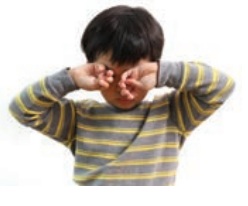
Do you know
A condition known as
digital eye strain is common among people working at computers all day. This
condition leads to dry eyes, eye strain, blurred vision and headache.
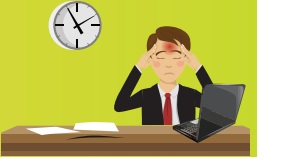
b. EARS

* Avoid loud noise.
* Do not listen to music at higher volume when using Earphones
or Headphones.
* Do not clean ears with ear buds.
* Dry your ears after taking bath.
* Cover your ears while swimming and bathing.
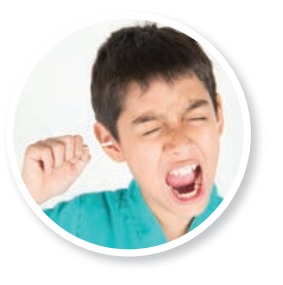
* Use earplugs or ear muffs (when you are exposed to loud sound).
* Consult a doctor if you have pain in ear.
Hearing loss can not be prevented
always. But hearing loss due to exposure to loud noises is can be avoided.
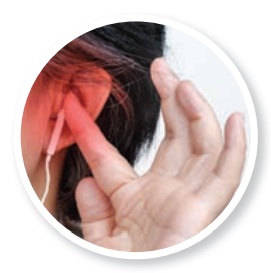
Do you know
Noise levels are
measured in decibels (dB). Any sound over 85dB can
be harmful to us.
c. NOSE

* Do not clean your nose by inserting any object into it
* If the nose is blocked due to cold it is better to use steam to clear
it.
* Do not pick your nose.
d. TONGUE

* We should clean our tongue daily with the tongue cleaner while
brushing our teeth.
* A dirty tongue may cause disease and bad breath.
e. SKIN

* Always use a mild soap.
* Keep your skin dry and clean.
* Dry your skin by rubbing gently with a clean cloth.
* Consult a doctor when you feel any itching, skin injury or
infection.
Let us Do
Read the given
statements carefully. Write ‘T‛ if it is True and ‘F‛ if it is False.
1.
Avoid playing video games or watching
TV for a long time. (T)
2. Avoid loud noise. (T)
3. Do not clean your nose by inserting
any object into it. (T)
4. A dirty tongue may cause disease
and bad breath. (T)
5. Dry your skin by rubbing gently
with a dirty cloth. (F)
Let us Practice
Make a figure ‘8‛ with
your eyes
This is a good exercise to practice
controlling the physical movement of your eyes.
• Draw a large figure of ‘8‛ on the
floor, about 10 feet in front of you.
• Trace the figure ‘8‛ with your eyes,
slowly, without shaking head.
• Do it clockwise for few minutes and
anti-clockwise for few minutes
III. Good
Touch, Bad Touch and Don‛t Touch
(In the park, Janani
plays with the puppy. She runs after a
butterfly to catch it)
Mother: Janani, did you notice
what happens when you touch the butterfly?
Janani:
Yes mom, it flew away.
Mother: Now, tell me, why do you
think it flew?
Janani: I think it did not like my touch.
Mother: Maybe, it did not. But,
it wanted to be safe. Now, I am going to tell you three rules to keep yourself safe.
Janani:
Okay, Mom.
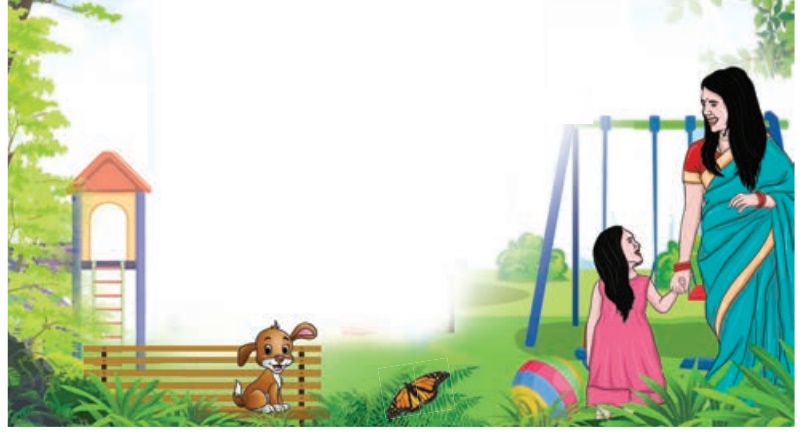
Mother: There are body parts that
you and others can see and touch like our arms and hands.
But, there are also some body parts
that no one should see or touch like our chest, between our legs and our
bottom. These parts are called private parts. What are they called?
Janani:
___________________________.
Mother: So now, let me tell you rule number 1. It is never right for anyone
to look at, touch or talk about your private parts. And it is never right for someone older to you to ask you to
look, touch or talk about their private parts.
Janani:
But mom, don‛t you give me bath daily?
Mother: Very good question! Who
else knows that I give you a bath?
Janani:
Dad, Grandpa, Grandma and Jagan know
that you give me bath.
Mother: Correct, when we are
small our mom or dad might touch us to help us to be clean. It is never a
secret and it is okay to tell someone about it.
Janani:
I got it mom. It is never right for
anyone to _________, _________ or __________ about my private parts. But, it is
never a _____________.
Mother: Very good! Some touches
are good or safe, like when we shake hands. But, some touches are bad or
unsafe, like when we hit someone. Can we hit someone?
Janani: _________________________.
Mother: Bad touches might make
you feel sad, angry, scared, or confused. If you do not like any touch or if it
makes you sad, angry or scared, tell them to STOP! Scream “STOP!” and run
away. This is rule number 2.
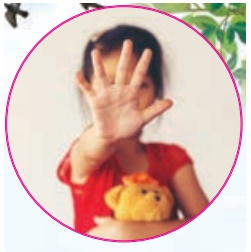
Janani:
Okay mom. If I do not like any touch,
I scream __________ and ____________.
Mother: Very good! Now rule number 3. Tell an adult you trust,
about the bad touch. Keep telling until you get the help you need.
Janani:
I should ________________
adults I trust till I get
__________.
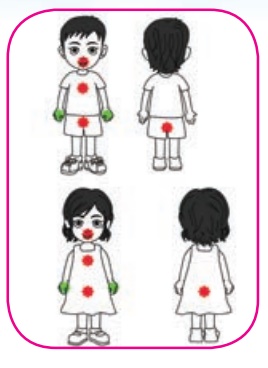
Mother: Janani, remember, no
matter who tells you. It is never your fault.
Janani:
But mom, would people I know also do
‘bad touch‛?
Mother: Anyone would do. So it is important that you keep all the three rules in mind even if you know the person. Can you say the rules?
SAFE CIRCLE MEMBERS

Do you know
If someone abuses you or
hurts you, you can call 1098 and get help.
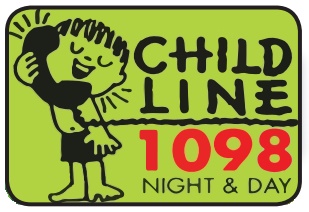
Let us Discuss
1. You are playing in the park. Someone
gives you eatable things / toys. What will you do?
I won't get those things.
2.
If someone touches you, you feel uncomfortable. What will you do immediately?
To whom you will inform this?
* I will leave that place immediately.
* I will inform to my parents or teachers.
IV. Physical or Sensory
challenge
Ramu went for shopping with his
father. On the way they saw a visually challenged person who tries to cross the
road. Ramu‛s father went to him and asked, “May I help you sir?”, And the
differently abled person replied, “Yes, I want to cross the road”.
Ramu‛s father joyfully helped him to
cross the road. By seeing this, Ramu felt proud of his father, and he also
wanted to help the needy. So, Ramu asked his father to teach him how to help
differently abled persons.
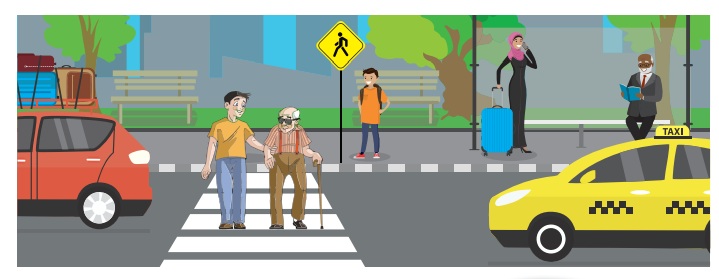
1. Differently-abled
persons
Think Zone
What do you think about
this picture?
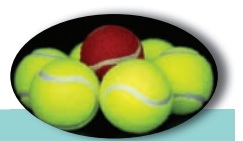
Not everybody can use all five senses.
Some lack the ability to use any one or more of them, such people are called
‘Differently-abled’.
Do you know
Braille is a reading and writing method for visually challenged person.
It has a raised pattern that can be read with the fingers.
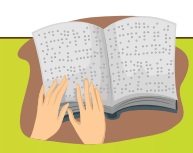
2. Let us know how to
help them
Helping people is very honourable, and
there are plenty of ways by which we can help differently-abled people.
* Ask first if they need any help from you and follow their lead.
* Speak clearly and listen to their
words well.
* Use direct words.
* Never tease them by calling with
specific names.
* Be aware of their personal aids, do
not cause any damage to the aids.
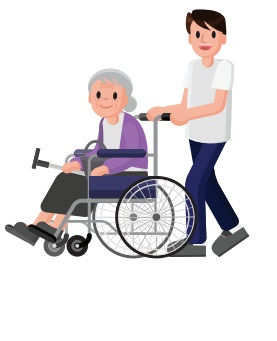
Your simple acts can be
helpful to them.
* opening doors for the disabled.
*
making way for them.
* bring them to cross the road.
* treat them as normal people.
By doing these you can exhibit that you want to help the differently-abled.
Do you know
We do not use the word ‘handicapped or disabled‛. We use ‘differently-abled'
Match
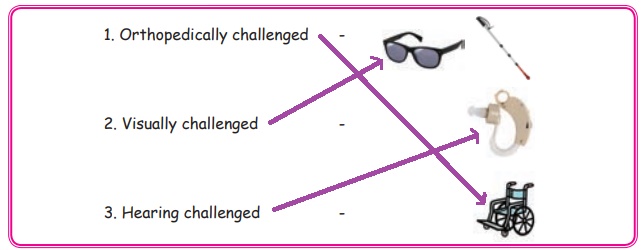
Let us Discuss
Gopi is travelling in a bus along with
his parents. The bus stops in a particular stop and a differently- abled person
gets into the bus. If you are Gopi, what will you do? Discuss with your
friends.
V. Importance of
Physical Exercise
Parents - teachers meet is going on in
Sheela‛s school. As her parents are out of the town, her grandfather attends
the meeting. He is a retired army person and even at the age of 90, he does all
his work by himself. Everyone in the meeting wonders “What is the secret behind
his good health?” and they asked him for his secret. Grandpa replied that he avoids
junk food and takes healthy and fresh food.He does physical exercises like
walking, running, jogging, and yoga. He advises all parents and children to do
exercises regularly.
Physical Exercise
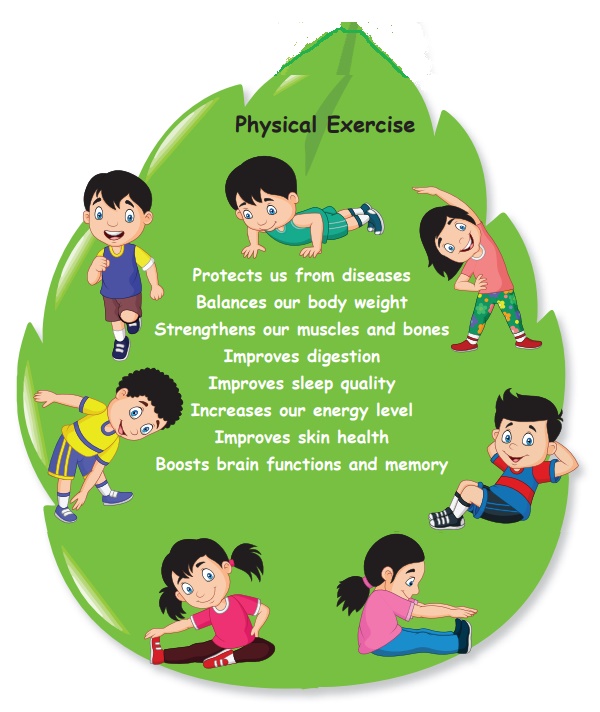
Protects
us from diseases
Balances
our body weight
Strengthens
our muscles and bones
Improves
digestion
Improves
sleep quality
Increases
our energy level
Improves
skin health
Boosts brain functions and memory
Find and circle the
words related to fitness.
(SLEEP, ENERGY, HEALTHY,
RUN, JUMP, PLAY, YOGA)
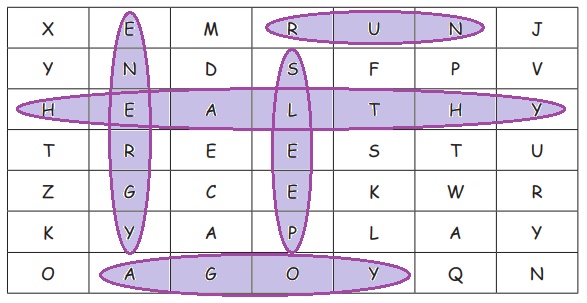
Related Topics